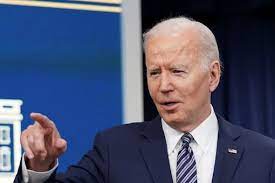WASHINGTON, Feb 10: As the US focuses on the Indo-Pacific, in particular the Quad, the Biden administration needs to address India’s ties with Russia and its “downward trend of democratic values and institutions”, said a report by the Democratic Party of the Senate Foreign Affairs Committee.
The report has called for supporting a strong and democratic India.
Senate Foreign Affairs Chairman Senator Robert Menendez Thursday said the US needs to approach the Indo-Pacific with a well-resourced, whole-of-government approach that synchronizes the military-security elements with diplomatic, economic, and civil society elements to ensure the greatest chance of success.
The “Strategic Alignment: The Imperative of Resourcing the Indo-Pacific Strategy”, a Majority Staff Report, was released by Menendez on Thursday.
“I believe that President Biden’s Indo-Pacific Strategy, released one year ago, adopts this whole-of-government approach. If fully equipped with the tools that it needs to be successful, this strategy will underpin the United States’ leadership in the most consequential and dynamic region of the world in the 21st century,” he said.
The report said the Biden administration was correct not to make its Indo-Pacific strategy solely about competition with the People’s Republic of China. But to succeed, it has to grapple with the realities of this competition for the US and the challenges it poses for its regional allies and partners, it said.
In its seventh and last recommendation, the Major Staff Report calls for supporting a strong and democratic India.
“Even as the administration rightly treats India as an important security partner, it will need to address the very real complications of India’s continued ties with, and dependence on, Russia for defence equipment and its recent downward trend of democratic values and institution,” it said.
According to the report, the United States and China vie for the position of India’s largest trading partner.
India’s Ministry of Commerce and Industry reported in June 2022 that trade with the US exceeded that of China, an important marker in the increasingly close ties between Washington and New Delhi, the report noted
“Indeed, the relationship between the world’s two largest democracies has been on an upward trajectory for more than two decades, overcoming Cold War antagonism and division over India’s nuclear programme and the country’s testing of a nuclear device in 1998,” it said.
Security ties have deepened dramatically in recent years as both countries are increasingly concerned about the implications of a more assertive China, the report said.
“The US and India are now major defence partners and the two countries have launched a new Initiative on Critical and Emerging Technologies to enhance cooperation on quantum computing, 5G and 6G networks, space, semiconductors, biotech, and artificial intelligence.”
The report follows up on Chairman Menendez’s 2014 Democratic Staff report, which underscored the importance of increasing diplomatic and development resources in the region.
It offers a comprehensive examination of US diplomatic and development agencies’ investment in the Indo-Pacific region since 2014. It also makes a series of recommendations to advance the administration’s capacity to meet the IPS’ objectives and to enhance US national and economic security.
“In the nine years, two administrations, and numerous strategies since my last report, little progress has been made to advance US diplomacy and development efforts in the Indo-Pacific, all while the PRC continues to expand its influence through aggressive impositions on states’ sovereignty, localized disinformation campaigns, and predatory economic investments,” Menendez said.
“If we are serious about advancing US interests in Asia and competing with the PRC (People’s Republic of China), we must match ambitious policy with ambitious resourcing,” he said.
The report recommends that the Biden Administration must significantly increase funding for diplomatic and development agencies across the US government and dedicate a larger portion of the Department of State operating budget and Washinton’s foreign assistance to advance priorities in the Indo-Pacific.
Congress should be made an active partner to ensure sufficient allocation of resources to the Indo-Pacific, to provide new authorities if and when needed, and to engage in effective oversight, it said.
The Indo-Pacific Strategy must include a substantive and action-oriented economic agenda that is commensurate with US interests and responsive to our allies’ and partners’ calls for increased US economic engagement, it said.
Seeking to deepen engagement with the United States’ network of allies and partners across the region, the report says that the US and its partners must strive to provide alternative financing and economic development projects to compete with China’s Belt and Road Initiative and the Digital Silk Road. (PTI)
Trending Now
E-Paper


